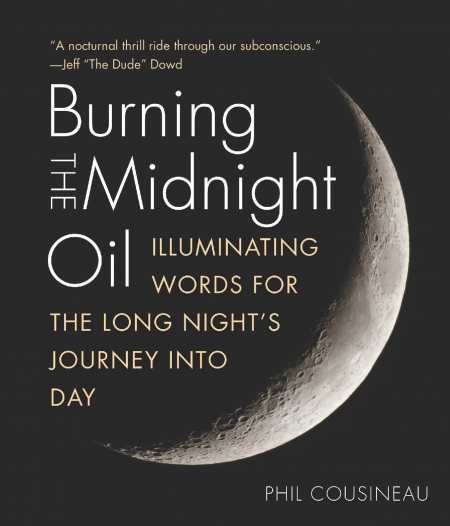
Burning the Midnight Oil
The Long Night's Journey into Day
These graceful essays reflecting on those who own the night shed light on the beauty we find in darkness.
Respected writer Phil Cousineau draws on decades of reading and writing in this far-ranging compilation of essays and poems about the night, Burning the Midnight Oil: Illuminating Words for the Long Night’s Journey into Day.
Cousineau’s past body of work encompasses many genres, and his previous publications (single volumes of poetry, photographs, and stories), as well as his role as editor of themed collections, give an indication of his natural curiosity and writing ability. It’s this latter format that is most reflected in Burning the Midnight Oil—essays, poems, and quotations are scattered threads woven into an elaborate tapestry.
The book is divided into five parts that feature different aspects of the night: its strange inhabitants, the nature of dreams, and the coming of the morning. Cousineau serves as a tour guide through the night, introducing us to selections from famous authors (James Joyce, William Blake, Jorge Luis Borges) and those lesser-known writers, which, for many readers, will be introduced here, thanks to Cousineau’s efforts. These include American poet Antler and the conservationist and writer Rachel Carson: the former has received many honors but is still largely unknown to readers who don’t normally delve into poetry; the latter, despite her fame, goes increasingly unread—a problem Cousineau remedies by including one of her most affecting quotes. In describing the night sky, Carson writes, “If this were a sight that could be seen only once in a century, this little headland would be thronged with spectators. But it can be seen many scores of nights in any year, and so the lights burned in the cottages and the inhabitants probably gave not a thought to the beauty overhead. And because they could see it almost any night, perhaps they never will.”
Cousineau is not eloquent only when he allows others to speak, however. With so many authors and styles represented in this literary smorgasbord, there will be, without doubt, parts of the whole that don’t appeal as much as others. But Cousineau is as witty and engaging a guide as could be, and when the book’s strands begin to come a bit unraveled, his chapter introductions and own poetic entries restore a graceful order to the proceedings.
Cousineau mentions that he has been compiling these reflections on night for many years, and it’s only that kind of long-term dedication that could provide such an entertaining, enlightening, and ultimately satisfying variety—one for which readers should be thankful.
Reviewed by
Peter Dabbene
Disclosure: This article is not an endorsement, but a review. The publisher of this book provided free copies of the book to have their book reviewed by a professional reviewer. No fee was paid by the publisher for this review. Foreword Reviews only recommends books that we love. Foreword Magazine, Inc. is disclosing this in accordance with the Federal Trade Commission’s 16 CFR, Part 255.
